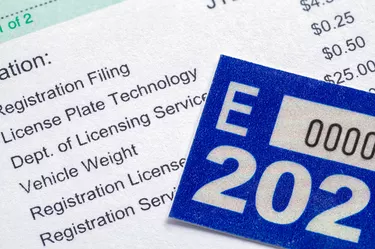
Are license fees tax-deductible? Sorry to get your hopes up, but drivers' license renewal fees are not tax-deductible unless you have a commercial license; these renewals are interpreted by regulators as nondeductible, personal expenses. While that payment you make every few years shouldn't cost that much, most people can't claim it on their returns. A driver's license tax deduction is only possible for self-employed truck drivers and business owners who need to have and maintain CDL licenses.
Taxes and License on a Car
Video of the Day
When people purchase new cars, they have to pay upfront fees, including sales tax, a vehicle registration fee and a documentation fee. The percentage of tax depends on where the vehicle is sold; it can be as much as nine percent and can include state, county and city taxes. The IRS does permit buyers to deduct sales tax paid on vehicle purchases, and you can itemize these on Form 1040's Schedule A.
Video of the Day
Vehicle registration fees come from the state where the car is registered. If you purchased your car from a dealer, they provide this service, so you won't have to go to your local Department of Motor Vehicles. You usually need to renew these registrations every year or every few years. Registration fees might be partially deductible on your federal income taxes, but certain restrictions on taxes and licenses on a car apply.
Individual taxpayers can also take deductions for things like charitable contributions, home mortgage interest and moving expenses.
Dealerships sometimes charge documentation fees to cover the costs of processing the purchase. Some states limit the amounts of these fees, while others don't. States have their own processes for obtaining and renewing driver's licenses. For example, drivers in the state of Arizona renew theirs every 12 years unless they are over age 65, but other states like New Jersey make you do it every four years.
What Type of Expense Is Tax?
Taxes owed, also known as taxes payable, are defined as current liabilities that you have not settled. You cannot deduct any of the federal taxes that you have paid in the past, but it is possible to deduct state taxes. If you want to do this, you can also enter them as an itemized deduction on Schedule A. The regulators at the IRS list the four kinds of non-business deductible taxes: state, local and foreign income, sales tax, real estate and personal property taxes.
Individual taxpayers can also take deductions for things like charitable contributions, home mortgage interest and moving expenses. Other categories include interest expenses, student loan interest, teacher educational expenses, medical and dental care costs, health savings accounts and investment-related deductions. Depending on the circumstances, you can sometimes deduct transportation and travel expenses; however, commuting to the same place for work every day doesn't count. Remember that there are many different laws that apply and that these regulations change often.
Deducting Business Expenses
The regulators at the IRS also provide guidance on deducting business expenses, stressing that deductible business expenses have to be ordinary and necessary. In other words, whatever you claim has to be part of your everyday business operations. The three main categories for these are expenses needed to figure the cost of goods or services sold, capital expenses and personal expenses. Examples in the first group might include labor costs, factory overhead, rent, interest and administrative costs. Small business owners who earn $26 million or less do not have to capitalize these direct costs in the way that larger ones do.
Capital expenses usually are higher than operating costs and can include costs to start up a business, purchase assets and make improvements. With motor vehicles, the costs of the purchases are usually capitalized via annual deductions for depreciation. You can't deduct personal, family or living expenses on a business tax return, but you can partially deduct expenses that are partly personal and partly for the company, like a home office.
Consider also: Can a Car's License Plate Fee Be Deducted on Federal & State Taxes?